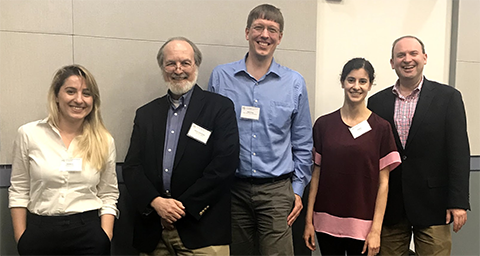Inclusive ICT Rehabilitation Engineering Research Center (RERC)
Grant #90REGE0008, National Institute for Disability, Independent Living, and Rehabilitation Research (NIDILRR), Administration for Community Living (ACL), U.S. Dept. of Health & Human Services (2018-2023)
Project Leads: Gregg Vanderheiden, Jonathan Lazar, J. Bern Jordan, Hernisa Kacorri, Amanda Lazar

(Left to right): Hernisa Kacorri, Gregg Vanderheiden, J. Bern Jordan, Amanda Lazar, Jonathan Lazar
Potential Impact for People with Disabilities
The purpose of this RERC is to find ways for everyone to use digital technologies which have become so essential to all aspects of life.
Our overall approach is dual in nature:
- Making sure that existing access solutions are effective, findable, affordable, and available on every computer or other digital technology.
- Identifying potential access issues in new and future technologies, as well as new solutions that ensure their accessibility.
Some targeted areas for impact by this RERC include:
- Improvement in the ways that researchers, product developers, and caregivers’ approach assistive technology for dementia, including use of technology to engage people with dementia in the solutions that can support them — resulting in more meaningful participation in everyday life.
- Greater inclusion of ICT users with disabilities in new technologies driven by artificial intelligence (AI), drawing from:
- Datasets and techniques created by the RERC team in collaboration with users with disabilities and
- Exploration of “teachable interfaces” as a mechanism for empowering users with disabilities to train the technology to better meet their needs.
- New models for trial, delivery, and licensing of computer access technologies.
- Better tools for users and clinicians to employ in identifying, evaluating, selecting, and personalizing existing accessibility solutions for ICT, thus increasing awareness of the solution strategies that are available.
- New accessibility approaches to capitalize on next-next-generation ICT, identified in collaboration with researchers, product developers, and key stakeholders.
- Increased commercial availability and practice of access solutions for ICT, facilitated by:
- Development, collection, and dissemination of checklists, tools and strategies for use by ICT developers;
- Collaborative efforts with and technical assistance to ICT developers; and
- Continued support for consumer groups, policy makers, and standards groups.
Links to RERC Projects
- Inclusive AI
- Extending data science and data-driven technologies to be inclusive.
- Teachable Interfaces
- Exploring “teachable interfaces” as improved approach for intelligent self-adapting interfaces that also puts interfaces back under user control
- Accessibility Needs & Design Methods for Dementia
- Exploring dementia and a method for advancing understanding of important elements of cognitive accessibility
- Tools to Help Users Select, Fit and Secure Computer Access Solutions
- Includes new trial, delivery, and licensing models
- Rethinking Accessibility Standards & Guidelines
- Creation of draft approaches for next-next-generation accessibility
- Moving Existing Accessibility Advances into the Lives of People with Disabilities
- Making it easier to create new and better accessibility solutions and to find accessibility solutions that exist anywhere in the world.
- Working with industry and policymakers to increase accessibility for kiosks and other public systems, and to make the Web more accessible. (Kiosk Accessibility) (Improving PDF Accessibility Tools for Content Creators) (Policy and New Legal Frameworks for Accessibility)
More Information on Trace Center and RERC Past and Current Work
Presentations (playlist on the Trace Center YouTube channel)

